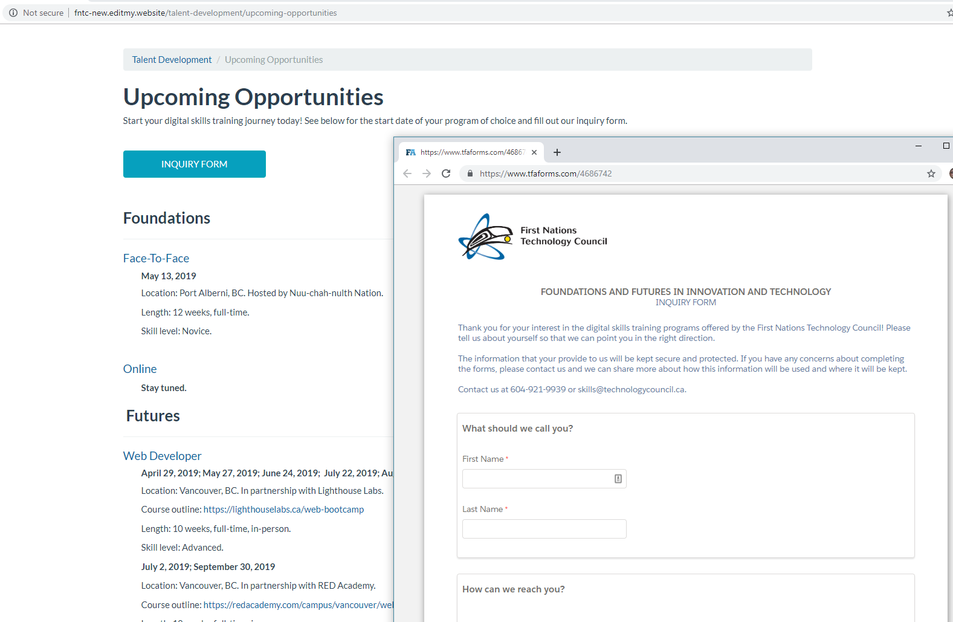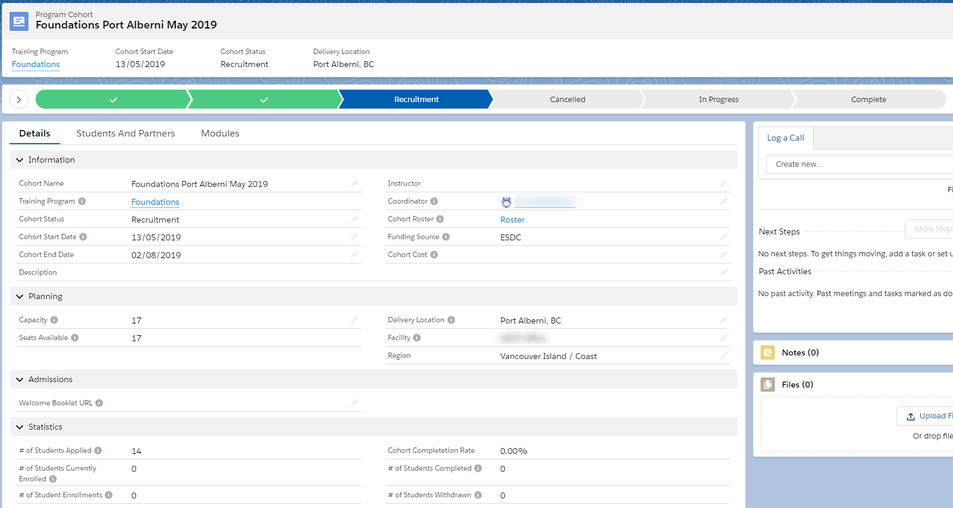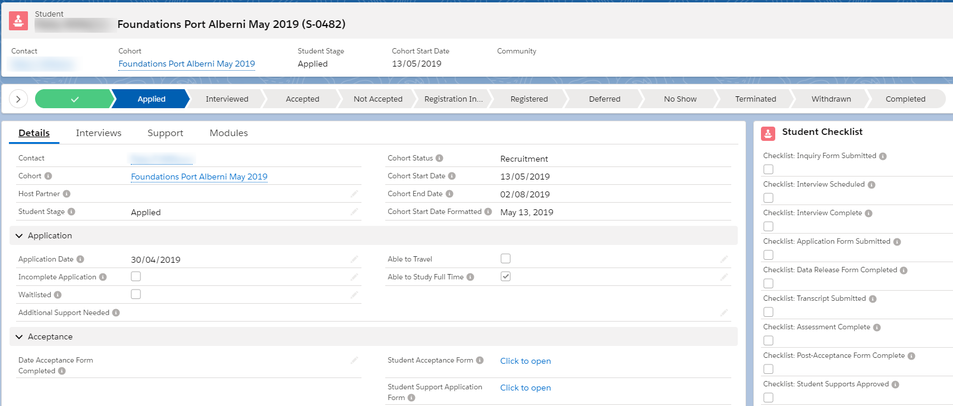About FNTC
First Nations Technology Council is an Indigenous-led NGO that provides free digital skills training for Indigenous people living in Canada. The Technology Council is working towards equitable access to technology for Indigenous communities in order to advance sovereignty in the digital age.
In early 2018, the Technology Council received significant funding to scale an innovative training program they had been piloting since 2016. The training program provides technical courses to Indigenous people at no cost. Courses range in difficulty, from a beginner-level introduction to advanced levels, where continuing students or students with previous experience can receive intensive training and work experience in specific areas such as coding, GIS mapping, software testing, or digital marketing. Classes are Indigenous-led and accessible to all students because, in addition to covering tuition, the Technology Council offers scholarships to help with any costs associated with training.
The Challenge
After the new influx of funding, the Technology Council began to grow rapidly. The expanded training program would eventually need to serve 800 students, compared to 30, and the Technology Council transitioned from two to 10 full-time staff members in under a year. In order to scale, the Technology Council needed greater system efficiency and better processes for managing students. However, due to the explosive growth, much of their workflow hadn’t even been finalized.
The Technology Council was already using Salesforce to manage the training program but had built minimal customizations. As a result, they had problems with data integrity, user adoption, and reporting. Tasks that should’ve been tracked in Salesforce were still being completed over the phone, while staff recorded information in spreadsheets or on sticky notes. To collect data for reporting to funders, the Technology Council had students fill out paper forms, which were mailed to the Technology Council’s main office and manually recorded in an outdated government database. None of this information passed through the Technology Council’s Salesforce database, meaning they collected the data, but couldn’t easily access it to understand student demographics or to improve and evolve their program offerings.
The Technology Council does a lot more than provide a training program; much of their work focuses on building relationships with students. The Technology Council staff expressed a desire to maintain a human element in any new admission process. It was critical to codify process steps like personal phone calls to build rapport and trust with prospective students.
Solution & Results
To start, Percolator conducted a discovery process to understand, at a practical level, the work that went into administering the training program: tracking students throughout their involvement with the training program, the kinds of reports the Technology Council was required to submit to funders, and what data they needed for internal evaluations. During discovery, we spent time engineering their business process and designed a seven-step system to register students for classes and track student progress. As we designed these new processes, we collaborated closely with the Technology Council staff, and they ultimately decided what functionality would most assist their work.
By identifying areas for automation and rethinking how the Technology Council’s Salesforce database was configured, we dramatically increased efficiency for the Technology Council staff at each step, while still including opportunities for communication over the phone and other types of personal relationship-building. Through custom development, we made government reporting possible inside of Salesforce so that admissions, internal reporting, and external reporting could be done on a single platform relevant to all levels of the Technology Council.
The Technology Council’s average class size has grown from 10 to 18, and they’re hosting triple the amount of classes at any given time. By 2021 they will have served more than 800 students.
The Technology Council’s business processes are clearly defined and their Salesforce is easy to use. By putting class details and embedded online forms on the Technology Council’s website, students can request information and apply for a course online with very little staff involvement on the back end. Online forms integrate directly with Salesforce so when students fill out their inquiry or application forms, that’s the only data entry required. Email responses to application forms are automated via Campaign Monitor so staff members spend less time on administrative work. Task generation is automated in Salesforce and each step that a registering student needs to complete is visually represented in a checklist on student records, decreasing reliance on staff memory and increasing accountability. And though much of the new process is streamlined, by including a standard step for a phone call, the Technology Council’s staff have codified time for high-quality relationship-building.
Now that all of FNTC’s data is captured inside of Salesforce, it provides more value for their work. Statistics that were previously unavailable (i.e. the percentage of enrolled students that are female) can now be found in less than 30 seconds, by generating a report inside Salesforce. Reporting to funders is completed by a single click of a button, requiring no extra work from Technology Council staff.
As the First Nations Technology Council continues to scale, they have a great foundation from which to grow their technology training program. Click on the images below to check out some screenshots from the project!
THE SOLUTION
By putting class details & embedded online forms on their website, students can request info and apply for a courses online. Through custom development we made government reporting possible inside of Salesforce so that admissions, internal reporting, and external reporting could be done on a single platform.
AT A GLANCE
Tripled the number of class offerings, 2x as many students per class, 800+ students served
Now that all of FNTC's data is captured inside of Salesforce, it provides more value for their work. Statistics about their cohort demographics that were previously unavailable can now be found quickly by generating a report inside Salesforce and reporting to funders is completed by a single click of a button.






